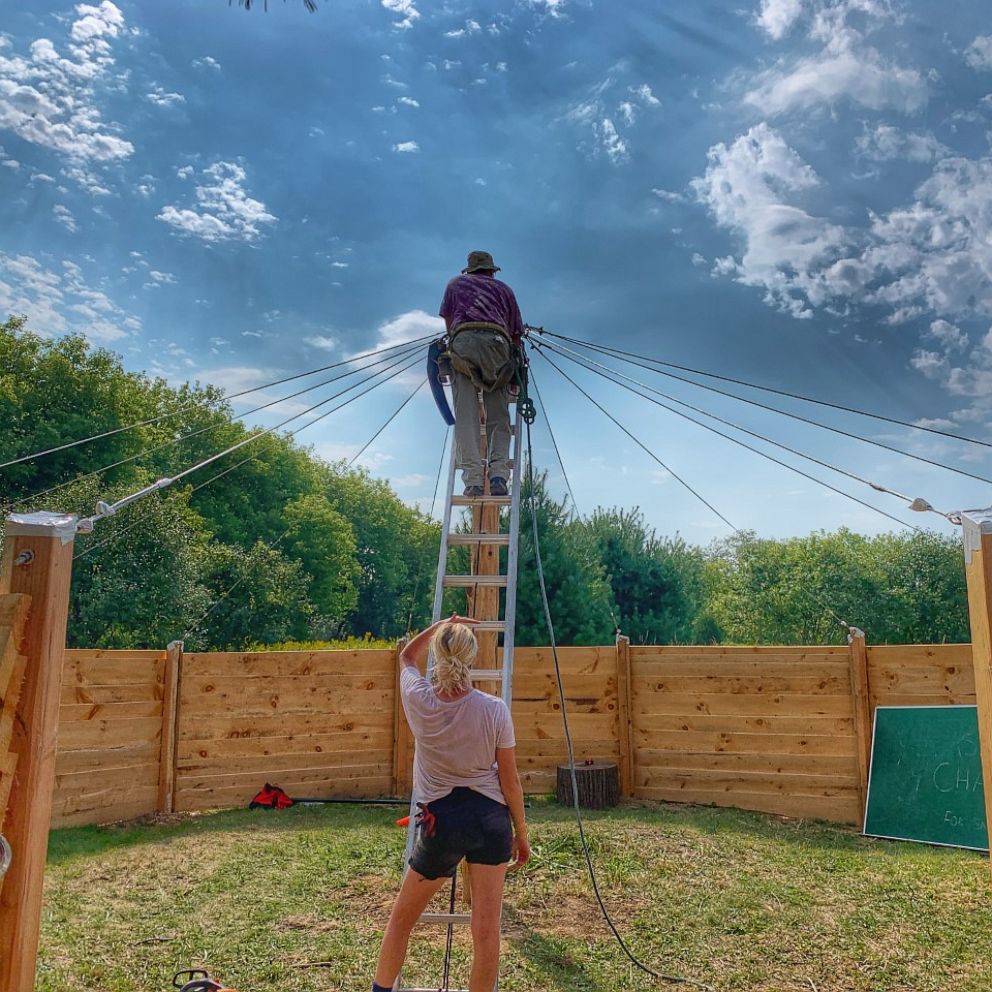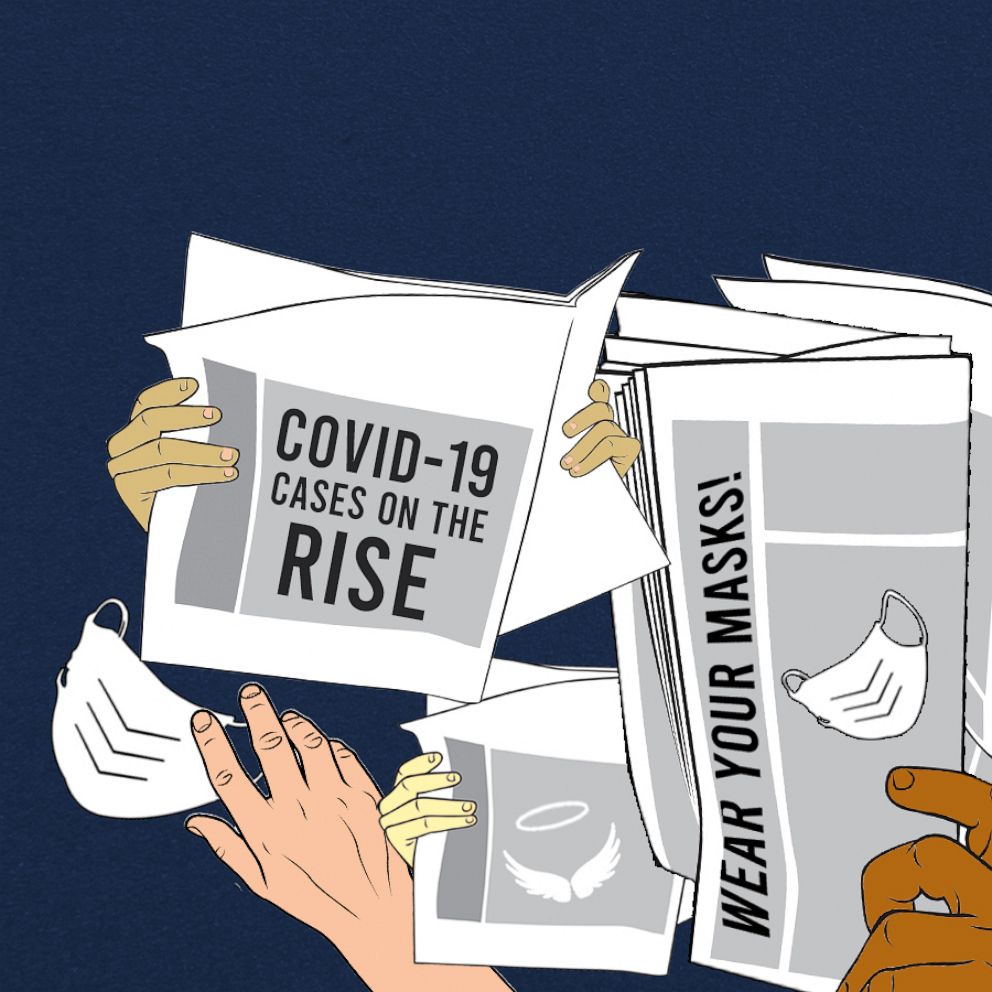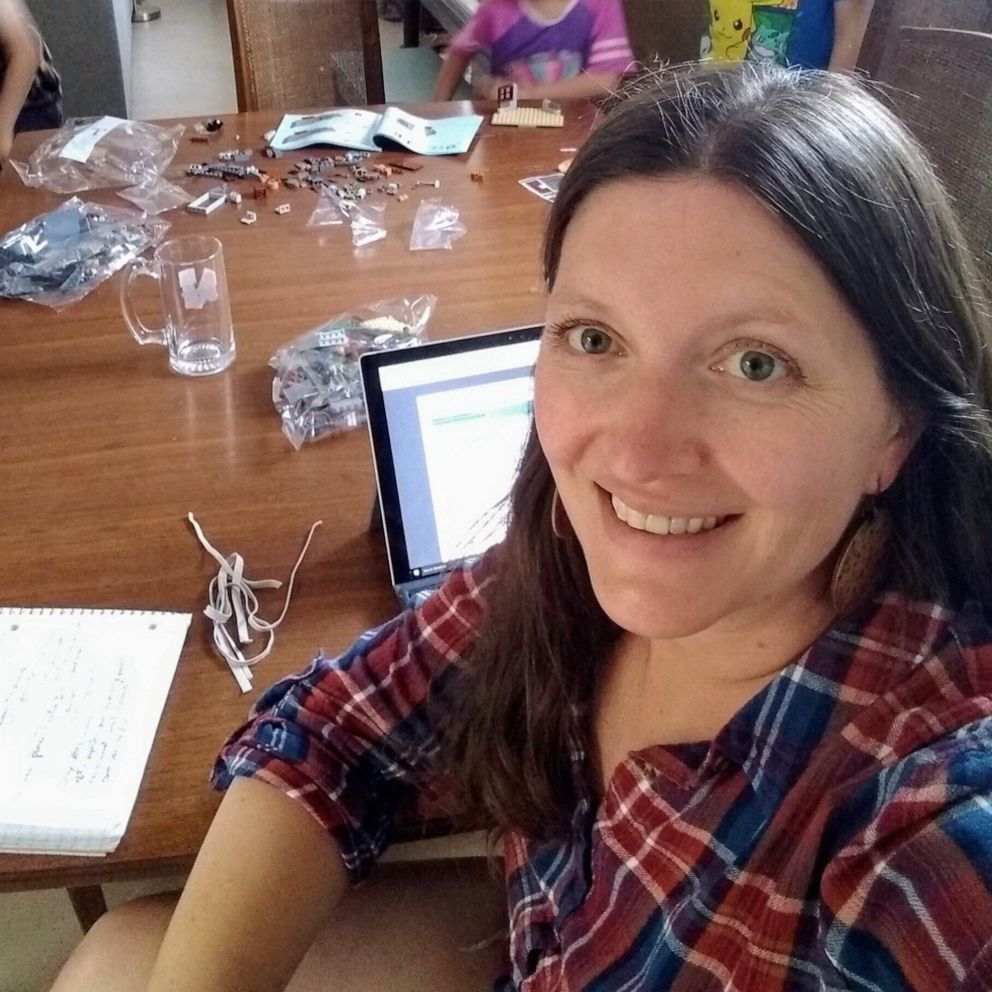Teachers speak out after voting to teach from home, refusing district's plan for return
Chicago educators sound off on educators' refusal to teach in person Jan. 27.
Chicago teachers are sounding off after voting to continue virtual teaching despite the district's order to resume in-person classroom instruction amid COVID-19.
The vote was announced on the Chicago Teacher's Union (CTU) website after Chicago Public Schools (CPS), the nation’s third-largest district serving 341,000 students in 638 schools, wanted 10,000 educators to return to school buildings last Monday in preparation for in-person learning by Feb. 1. CPS has since changed the return from Monday to Wednesday, in accordance with the teachers union, CPS confirmed to "Good Morning America."
The union, though, says its still fighting the district's return dates due to health concerns and what its members believe to be an inadequate safety plan. In response, teachers will not comply and said they will engage in the collective action to remain remote, according to the union.
"Until we have a safe return plan that we agree upon, we will continue to teach remotely," said Katie Osgood, a special education teacher at Suder Elementary in Chicago and co-chair of the special education committee of the teachers union.
"Remote learning is not ideal. No one said it was, but it's safest," she added. "It's working so far and my kids are getting services. We are working and I want to continue to do that until the reopening plan is set."
On Jan. 27, kindergarten through eighth grade teachers are expected to return in person, according to CPS. Approximately 70,000 students will return days later for part-time, in-person classes. The learning plan for high schoolers is still being evaluated and families opting for remote learning are still doing so.
Regardless of how many students decide to continue remote learning, teachers are being told they must show up to their classrooms, said Adrienne Thomas, who teaches fourth and fifth grades.
"They rolled out hybrid learning. Those who decide to learn [in person] will split into pods, coming in on different days. Those staying home will be learning online," Thomas told "GMA." "The literal difference is now I'm wearing a mask and a face shield."
Thomas also teaches at Suder Elementary and is her school's union delegate. She says she will have three students returning in person. The other 25 are choosing to stay virtual.
Returning unvaccinated
Just 19% of eligible students returned to Chicago schools on Jan. 11 after the entire district engaged in online instruction since last March, according to the union. These students included pre-K and special education clusters, whose teachers were expected to return to the building Jan. 4 to set up their classrooms.
In the news release published Sunday, the union argued that CPS failed to arrange for 1,500 CPS health professionals such as school nurses, LPNs, speech pathologists, physical therapists and more to be vaccinated when they were eligible back in December.
"Chicago mayor Lori Lightfoot’s insistence on reopening all elementary school classrooms without vaccinating educators by February 1 regardless of the risk to staff and students from the pandemic comes as thousands of CTU members are struggling to receive accommodations to remain teaching remotely to protect their own health or that of a beloved household member," the teachers union said.
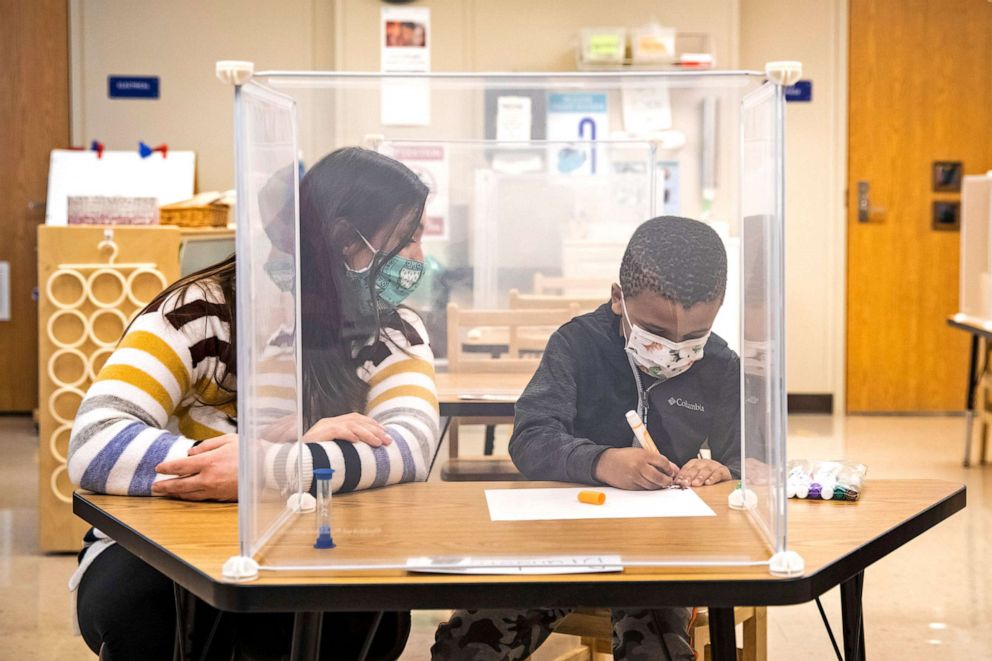
On Jan. 22, CPS and the Chicago Department of Public Health (CDPH) publicly announced the plan to vaccinate thousands of eligible staff and educators beginning mid-February, "at which point it will begin a multi-month effort to offer vaccinations to eligible staff," CPS said.
Mayor Lightfoot said in the release that vaccinating frontline essential workers, including CPS educators and staff, is a key goal of Chicago's vaccination strategy.
"Not only will this vaccination plan bolster our safety initiatives as we welcome students and staff back into the classroom, but it will also put our city on the right track to reopening and returning to a sense of normalcy," Lightfoot added. "I am excited for our school staff and educators to get vaccinated and look forward to working closely with CPS and CDPH to make sure it is accessible and distributed equitably."
The total number of COVID-19 cases in Illinois stands at approximately 1,104,763 with a total of at least 20,744 deaths since the start of the pandemic.
The union said the district has "refused to allow educators to be vaccinated before they’re forced back into schools that have struggled with basic safety needs, from adequate masks, hand sanitizer" and proper ventilation needed to stop the spread of COVID-19.
In its "Shared Vision for a Safe Reopening" guide, CPS published a chart noting all the major health and safety protocols that are in line with the union, as both parties try to reach an agreement.
In response to the request to delay the return until all staff is vaccinated, CPS noted that public health experts say schools can reopen safely at this time, "and they have not recommended delaying reopening until vaccinations are complete."
"Additionally, CPS cannot mandate staff members to take the vaccine," CPS added.
ABC affiliate WLS-TV in Chicago, reported Sunday that Illinois has moved to Phase B of its vaccination plan. Those eligible include people over 65 and essential workers such as first responders, school officers, correction officers, inmates, people in food and agriculture and grocery store workers. Teachers and principals are also eligible for the vaccine under essential workers. This includes an additional 3.2 million people, approximately.
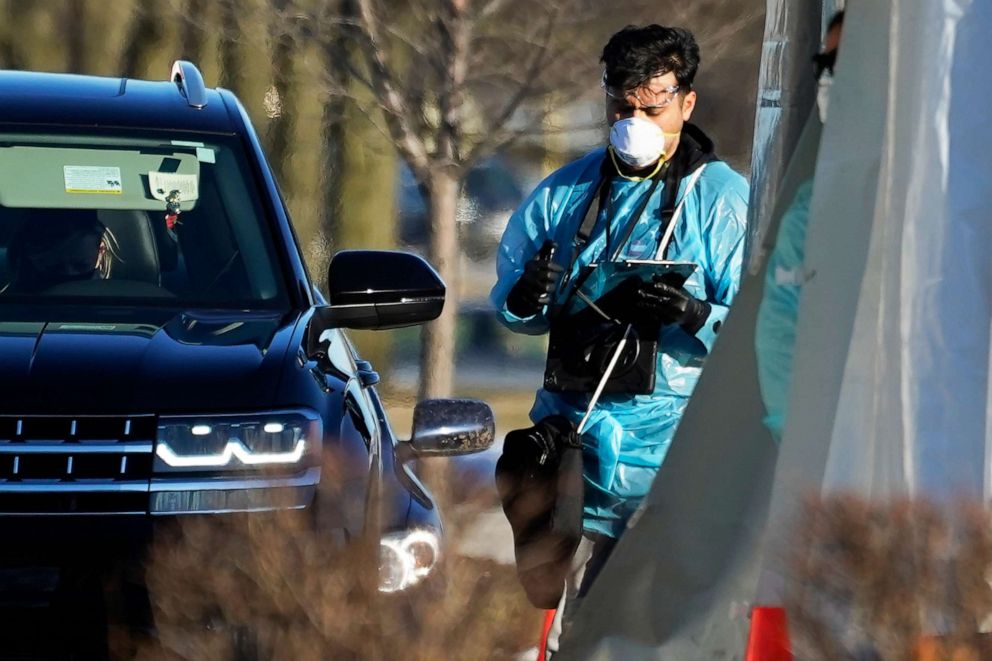
Karen Ayala, executive director of the DuPage County Health Department told WLS that there's a larger amount people who are interested in getting the vaccine than the amount of vaccine that is currently available. DuPage is one of the five counties that surround Chicago's metropolitan area.
"I want to reassure people that we anticipate having plenty of vaccines over time to get distributed to people who want the vaccine, but at this moment our interest of people very dramatically outstrips our capacity from a vaccine standpoint," Ayala said.
Negotiations between district leaders and teachers union
CPS said it agrees with the union on social distancing, required face coverings, PPE, health screenings, temperature checks, hand sanitizer, disinfectant wipes plus equipment for proper ventilation. CPS said its supports staff for contact tracing and assembling a safety committee, though it does not believe that the absence of one should stop school operations.
The American Academy of Pediatrics (AAP) recommends the goal should be "to have students physically present in school," though its critical schools closely follow guidance provided by public health officials.
"Children absolutely need to return to in-school learning for their healthy development and well-being, and so safety in schools and in the community must be a priority," said Dr. Lee Beers, fellow and president of the AAP. "We know that some children are really suffering without the support of in-person classroom experiences or adequate technology at home. We need governments at the state and federal levels to prioritize funding the needed safety accommodations, such as improving ventilation systems and providing personal protective equipment for teachers and staff."
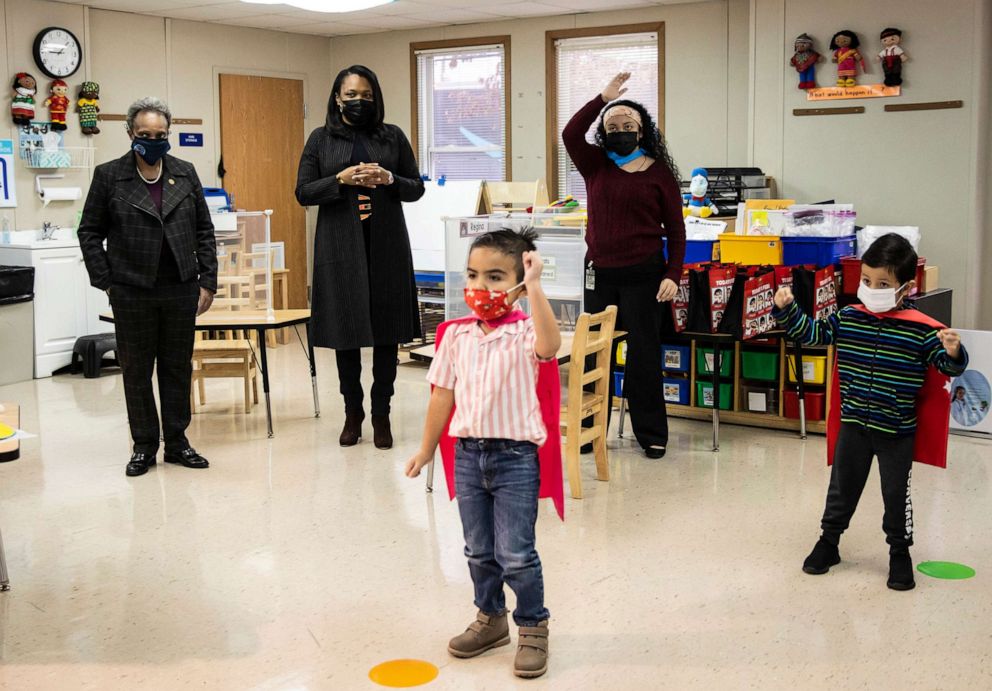
On Sunday, CPS CEO Dr. Janice Jackson and chief education officer LaTanya D. McDade, informed staff and families of the latest negotiations with the teacher union.
In the letter shared by CPS with "GMA," it states how its been working with union officials to reach an agreement in regards to in-person learning.
"We now agree on far more than we disagree, but our discussions remain ongoing, and additional time is needed to reach a resolution," the CPS executives wrote in the letter, which was also shared on Twitter. "To ensure we have the time needed to resolve our discussions without risking disruption to student learning, we have agreed to a request from CTU leadership to push back the return of K-8 teachers and staff to Wednesday, Jan. 27."
CPS said only preschool and cluster classroom staff returned to work on Jan. 25.
The scheduled return date remains Monday, Feb. 1 for grades K-8 and CPS said its goal is to reach an agreement with the teacher's union.
"Students in over 130 private and parochial schools and over 2,000 early learning centers across the city have been safely learning in their classrooms since the fall, and we must provide that same option to our families who, through no fault of their own, have been unable to make remote learning work for their children," CPS wrote, adding its seen seen grades, attendance and enrollment drop significantly for many students in recent months with the impact being felt most by its Black and Latinx students.
Greg Michie, a union member and seventh and eighth grade teacher in the Back of the Yards community of Chicago, said that while he wants to return to face-to-face instruction, he feels it isn't safe at this time.
"Many neighborhoods like the one where I teach -- Black and brown communities -- have been hit hard by COVID," Michie told "GMA." "There's been a lot of loss. Many parents I've talked to just don't feel it's safe to send their children back to school yet."
CPS said it's pursuing the return because "local, state and federal health officials have made it clear that schools can operate safely with proper mitigations" and its been working with the Chicago Department of Public Health to develop a comprehensive health and safety plan in which its invested $100 million.
"In addition to providing accommodations for all staff who have high-risk medical conditions, we are working hard to find ways to accommodate teachers with vulnerable family members at home in a way that does not jeopardize student learning," CPS noted.
The potential consequences of refusing to return
In the face of CPS' return plan, a number of charter school networks within the district say they have chosen to remain remote until at least April when there's wider access to vaccines and virus numbers decrease, the union said.
The teachers union had a collective bargaining agreement approved after a 2019 strike, according to the Associated Press. It prohibits its roughly 25,000 members from striking and bars district officials from locking them out.
"District officials have said a union vote to disobey the order to return to schools on Monday would violate the contract," the AP reported Monday.
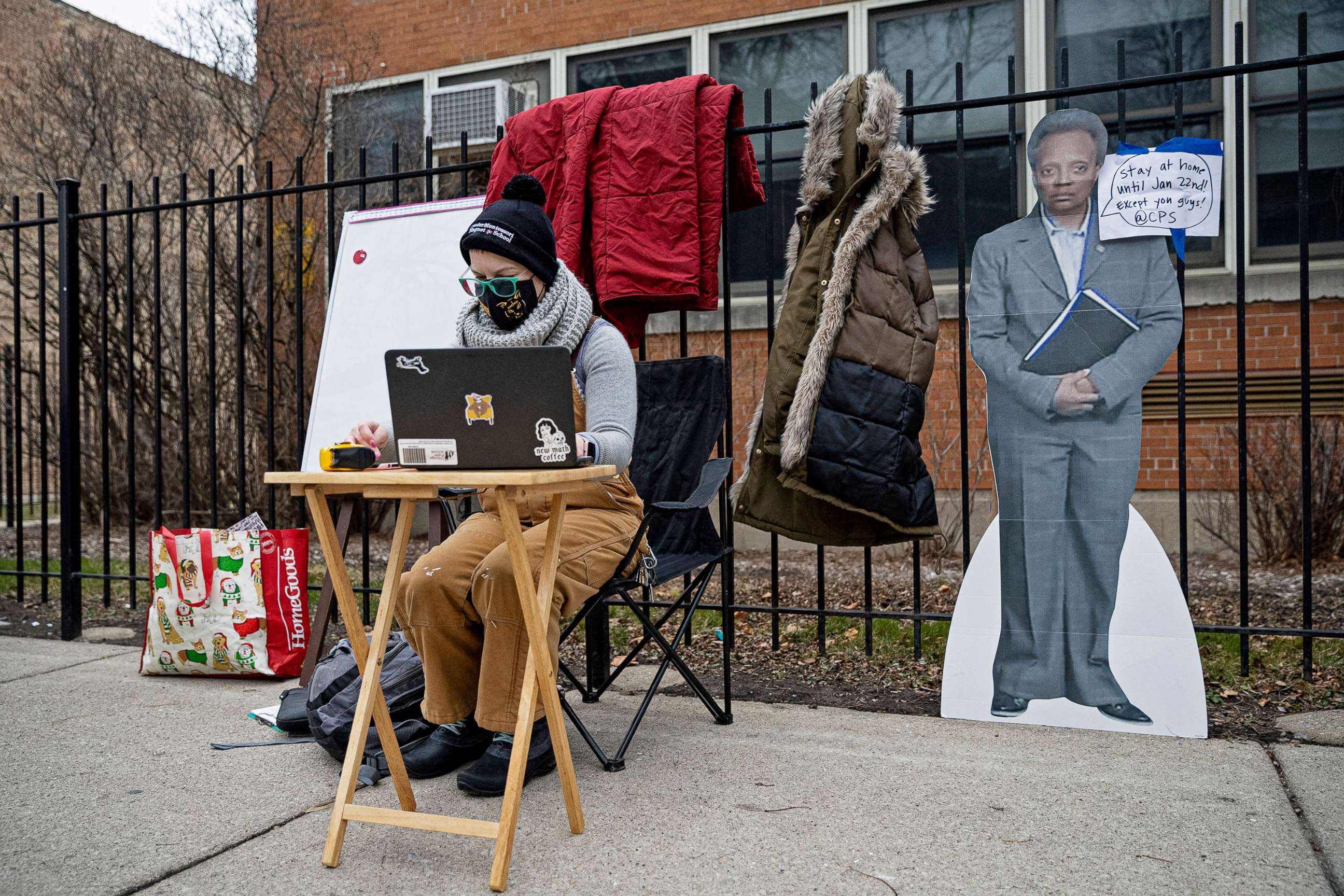
In early January, Jackson told WLS that CPS was aware some staff members would not choose to return.
"Those individuals will be deemed absent without leave and they will not be eligible for pay going forward," Jackson told the station Jan. 8.
In an email shared with "GMA" that was sent Jan. 21 from CPS to all teachers and staff, CPS said teachers and staff who fail to report to work in person "constitutes an illegal strike."
Thomas disagreed.
"This is an unprecedented time and we are actually looking at something almost completely unrelated," Thomas said. "We are looking at health standards and what's [considered] a healthy environment. We would be withholding our labor due to safety concerns. We wouldn't be withholding our labor due to contractual concerns."
Under Illinois labor laws, teachers can only go on strike when there is no contract in place, according to libertarian nonprofit the Illinois Policy (IP). The question is whether refusing to return to in-person work specifically can be deemed an official "strike."
"It’s a gray area that likely could require resolution by the Illinois Educational Labor Relations Board," the IP reported.
Thomas said a number of her fellow union members who didn't return to school buildings in defiance with CPS were locked out of their emails, telework system and will likely be docked pay.
Since CPS said it's now working with union officials, it's unknown if the vote to defy the return to schools will still result in disciplinary action.
Osgood, Michie and Thomas and the other 71% of the 86% union members who voted to stay remote, said they aren't backing down until a more solid reopening plan is put in place.
Even with only three students returning to her classroom, Thomas said she's standing up for her colleagues who are teaching under riskier circumstances.
"I cannot participate in a system that's going to lead to Black and Brown people dying, so that's why I'm not going in," she said.
Both Michie and Osgood said they'd like to at least see a longer delay in return.
"We are not ready," Osgood said. "Even if it's a couple of weeks, give us time to figure this all out and it'll go so much more smoothly. It'll be an easier transition for our kids if we understand what the safety precautions are [and] place a safety committee within the school."
"Come Feb 1, I will be doing what my union sisters and brothers are doing." Osgood added. "Whatever that is."
